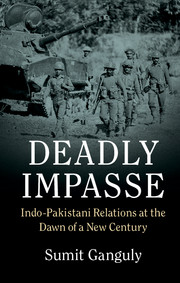Book contents
- Frontmatter
- Dedication
- Contents
- List of maps
- Preface and acknowledgments
- List of abbreviations
- 1 The rivalry revisited
- 2 Kargil and after
- 3 The troubled decade in Kashmir
- 4 The road to Operation Parakram
- 5 The composite dialogue and beyond
- 6 An extension of the rivalry
- 7 Policy implications
- In lieu of an epilogue
- Appendices
- References
- Index
In lieu of an epilogue
Published online by Cambridge University Press: 05 March 2016
- Frontmatter
- Dedication
- Contents
- List of maps
- Preface and acknowledgments
- List of abbreviations
- 1 The rivalry revisited
- 2 Kargil and after
- 3 The troubled decade in Kashmir
- 4 The road to Operation Parakram
- 5 The composite dialogue and beyond
- 6 An extension of the rivalry
- 7 Policy implications
- In lieu of an epilogue
- Appendices
- References
- Index
Summary
In May 2014, the right-wing BJP won an overwhelming victory in India's general election. Narendra Modi, a former chief minister of the western Indian state of Gujarat, as expected, assumed the office of the prime minister. In one of his most significant (and indeed unprecedented) acts, immediately after his election, he invited all the heads of state of the SAARC to New Delhi for his inauguration. Obviously included in this delegation was his Pakistani counterpart, Prime Minister Nawaz Sharif. This was seen as a critical gesture given Modi's fraught relationship with India's Muslim community and Pakistan because of a pogrom that had taken place in the state of Gujarat in February 2002 when he was the chief minister of the state.
Indeed, a number of commentators held out hope that despite Modi's background and reputation for hawkishness, the invitation to Sharif as well as the leaders of other states of South Asia presaged an interest in improving relations with India's neighbors. These hopes, however, were soon to be dashed.
In the aftermath of his assumption to office a decision was made to resume the bilateral talks that had been initiated with Pakistan during the UPA regime. To that end, the Indian Ministry of External Affairs in July 2014 agreed to resume a dialogue in August in Islamabad. In the past, prior to most India–Pakistan discussions (especially those held in New Delhi) Pakistani delegations had met with various Kashmiri separatists on the eve of the talks. Indian authorities had routinely protested these contacts but, in the end, they had proceeded with the talks as planned. On this occasion, however, the Modi regime, which had explicitly warned against any such meetings, adopted a different stance. When the Pakistani High Commissioner to New Delhi, Abdul Basit, met with Shabir Shah, a well-known Kashmiri separatist, the new government chose to call off the talks.
Pakistani commentators, not surprisingly, criticized the Indian government's decision to call off the talks. Interestingly enough, many of their Indian counterparts shared the view. These criticisms notwithstanding, it is possible to justify the regime's decision to bring a halt to the talks. As discussed in an earlier chapter, it is far from clear that the composite dialogue actually accomplished much. Pakistan's policy-makers, civilian and military alike, were not in a position to make any credible commitments to their Indian counterparts.
- Type
- Chapter
- Information
- Deadly ImpasseIndo-Pakistani Relations at the Dawn of a New Century, pp. 129 - 133Publisher: Cambridge University PressPrint publication year: 2016

